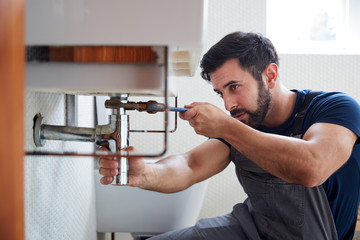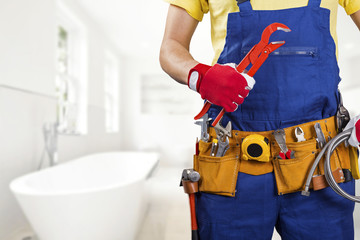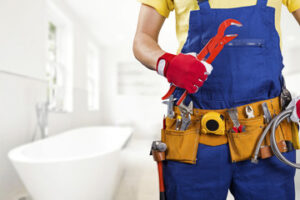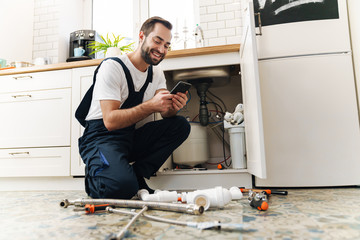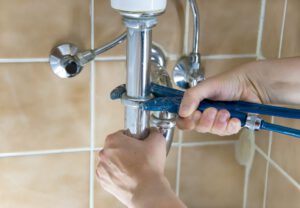Plumbing is the network of pipes that carry water in and out of a home. It includes two subsystems: the supply system and the drain system. The supply system delivers freshwater through smaller pipes under pressure, while the drain system takes wastewater away.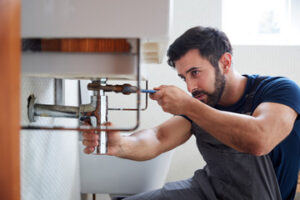
A career in plumbing is ideal for those who enjoy hands-on work and problem solving. It’s also an excellent choice for those who want to make a difference in their community. Visit Website to learn more.
Plumbing is the system of pipes, fixtures and appliances that deliver fresh water and remove wastewater from homes and commercial buildings. It is essential for sanitation, hygiene and human health. It also ensures proper waste management and disposal, which reduces environmental impacts. Professional plumbers are skilled in installing, repairing and maintaining these systems. They work with a variety of materials, including copper, plastic and PEX, and are knowledgeable about local building codes and regulations. They can help you choose the right plumbing fixtures for your home or business.
The plumbing system in a house or commercial building starts with the water supply line that connects to the city water main. From there, water is distributed to various outlets throughout the property, such as sinks, toilets, showers and dishwashers. The plumbing system also includes drain lines that carry wastewater to the sewer line or septic tank. A properly functioning plumbing system should be free of leaks and other problems. Regular maintenance and repairs are crucial to preventing expensive water damage.
In a home, the primary components of a plumbing system include: pipes, valves and fixtures. Valves allow you to control the flow of water to different parts of the house. Pipes are usually made of durable metals like copper or PVC and may be insulated to prevent freezing. The plumbing system also includes a water heater, which heats the water for use in sinks, tubs and showers. In some homes, the plumbing system also includes a backflow preventer, which helps to protect the water supply from contamination.
Piping is the system of pipes, valves and other components that transport fluids from one place to another. It can be used for many purposes, including transporting chemicals, gases, water and other liquids. A piping system is typically designed using a special software program called CAD, which allows engineers to visualize the layout of the pipes and their connections. The piping system may be subject to rigorous testing and inspections to ensure that it complies with industry standards.
A piping system is often subject to corrosion and other damage from the environment, water and debris. In addition, it is important to maintain a proper temperature and pressure in the pipes. Failure to do so can cause them to burst or break.
Sewer line
When a home experiences problems with its drains, oftentimes the problem stems from the main sewer line. Whether it’s a backup or clog, these issues can be difficult and expensive to resolve. A professional plumber can help diagnose and repair any issues that may arise with a faulty or damaged sewer line.
Most homeowners don’t think about their sewer lines until something goes wrong. However, they’re a vital component of a healthy and hygienic plumbing system. Sewer lines are the last stretch of pipes that connect your house to the local sewage system or septic tank. They take waste from your home’s drains and sewer systems, including toilets, tubs, and sinks, and transport it to the city sewer line or septic tank for processing.
Like other plumbing pipes in your house, your sewer line can become clogged with food waste, toilet paper, grease, fat, soap scum, and other debris. These items can also cause wear and tear on the pipe, making it more prone to damage over time. To keep your home’s plumbing and sewer system working properly, it’s important to maintain regular cleanings and inspections.
Having a sewer line with a clean-out makes it much easier for your plumber to clear clogs and other issues that may arise. If your home doesn’t have a sewer clean-out, it’s recommended to have one installed now to avoid the hassle and expense of dealing with a major blockage in the future.
Another factor that can affect how long it takes to replace a sewer line is the length of the run. If your line extends farther from the house, it will take longer to access than a line that’s closer to the property line.
Knowing how long it will take to complete a sewer replacement can help homeowners manage expectations and prepare their budgets accordingly. It can also help them protect against disruptions and ensure the process complies with city guidelines. Damaged or faulty sewer lines can pose health and safety risks, from sewage buildup to hazardous gases. By taking the time to understand these timelines, homeowners can feel confident that their sewer work will be completed properly without delay.
Drains
Drains are used in a variety of surgical procedures to remove pre-existing fluid from a surgical wound. They can also be placed in the chest to evacuate postoperative pneumothorax, or they may be placed in the abdomen for removing septic exudate. These devices are important to reduce complications following surgery. They can also help to speed up recovery by reducing pain and swelling, and promoting a healthy healing environment.
Drain management involves frequent monitoring for fluid accumulation. This requires regular emptying and logging of drainage in order to detect any signs of infection or other problems. This is especially important because drains are vulnerable to becoming clogged or obstructed, which can lead to serious complications and delay wound healing.
There are several types of drains, including passive and active, as well as external or internal. Passive drains rely on gravity or capillary action to collect fluid, while active drains use a suction/vacuum force (such as that produced by a connected wall suction unit or the squeeze of a bulb) to draw fluid into a reservoir.
After a drain is placed, the patient should empty it at least 2-3 times a day to prevent an excessive accumulation of body fluids. The fluid should be emptied into a container marked with milliliters, which is then recorded in a drain log. The skin around the drain should be scrubbed clean prior to emptying the drainage tube, and the patient should wear gloves when handling it.
Infection is a major concern with drains, and removing them can often eliminate this risk. However, infections can still occur, so it is important to monitor the drainage site and report any unusual symptoms to your doctor.
It is also important to know that not all surgeons recommend the use of drains in certain surgical procedures, and even if a patient chooses to have them placed, they must follow strict management guidelines to minimize complications. Patients should discuss this with their surgeon before the operation to ensure that they understand how to manage their drains properly. In addition, patients should be aware of the risks associated with a drain-free approach to recovery and understand that this might extend their hospital stay.
Water heaters
Water heaters might look like big metal cylinders tucked away in a basement or utility room, but on the inside they’re filled with ingenious design. They’re powered by electricity, burner oil or natural gas and use the principle that hot water rises to supply your household with piping hot showers. The most common types of residential water heaters include tank-type, hybrid, point-of-use, and tankless water heaters.
The tank-type water heater has a dip tube that feeds cold water from your home’s main water line into the bottom of the water heater, where the heating mechanism (either an element or a burner) stays on until the water reaches your desired temperature. Water is heated as it travels through the dip tube, which can be a copper tubing or PVC pipe. This type of heater is ideal for households with a lot of water-using appliances because it can hold 40 to 60 gallons of hot water at a time, depending on the size of your house and expected water usage.
A drain valve is located at the bottom of the tank and a shut-off valve is placed outside the tank. You can also locate a pressure relief valve and a water heater panel that lets you adjust the thermostat and check the safety of the unit.
ENERGY STAR certified water heaters offer a more efficient model that can save you money on your energy bill. If you’re interested in purchasing one, find out whether rebates are available in your area.
When it comes to maintenance, read your water heater’s user manual to learn more about what to do to keep your appliance working properly. For example, storage water heaters must be flushed and drained every six months to remove sediment and reduce the risk of rust.
The most important thing to know about any water heater is that it’s not designed to last forever. If you plan on moving soon or your existing water heater is approaching its end of life, then consider replacing it with a new, energy-efficient model. A plumber can help you determine the best option for your family’s needs, and they’ll install your new unit according to local plumbing codes.

